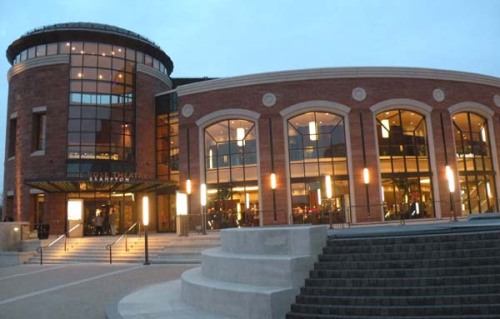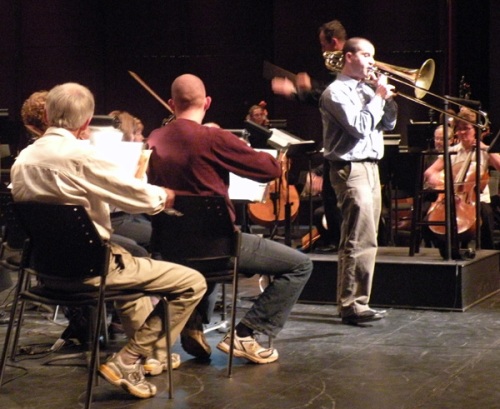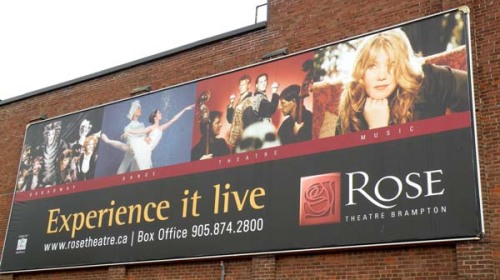
Civic ArtsSense
The city of Brampton, Ontario, Canada, one of the satellite cities of what is known as the GTA (the Greater Toronto Area), is a role model for the kind of community where the arts matter.
It is also the kind of city where music matters; especially The Brampton Symphony Orchestra , which by the way is experiencing a renaissance as a community orchestra.
The BSO however is also engaged in a unique hands-across-the-border — the United States/Canada border that is — that is indicative of symphony music as a not-to-be-underestimated partner in the travel and tourism business.
When people travel, the arts (music especially) frequently are a significant part of the itinerary-building that in today’s world of electronic trip planning allows travellers to search out innovative arts events wherever they are going.
And many destinations that might not make it onto the “top 10” list, have discovered that the arts bring much needed revenue to the bottom line of any community. (See Why Cultural Industries Are Good for Business.)
Brampton is a city that has an informal “twinning” arrangement through the medium of music with South Miami Beach; and recently The BSO played another transborder concert at that city’s Lincoln Theatre.
A significant part of this transborder experience was that the BSO-Lincoln Theatre crosscultural event was a benefit concert for the SoBe Music Institute, an institution with “a long term mission to develop and build a world-class arts education and performance institute in the south for the community and for professional degrees in music, music-theater, theater, visual arts, film-video, dance and literature.” Sobe Music is also an independent music school that employs some of the New World Symphony players as teachers.
The Lincoln Theatre by the way is also home to The New World Symphony, “America’s Oldest Orchestral Academy.” The NWS Symphony is a very high calibre Orchestral Academy training school for musicians who are directing their career towards orchestral playing. Its program lasts three years.
Musicians helping musicians; musicians educating musicians. Transborder arts communities supporting each other. What a principled, idealistic, and yet pragmatic approach to supporting the arts in general.
I hope lots of municipal governments and other civic authorities out there are listening.
Maestro please
At the Lincoln Theatre, under Maestro Robert Raines the BSO recently performed an eclectic evening’s music program titled “Rhapsody, Concerto … and All That Jazz!” A week later they were home in Brampton, performing a special program honouring Earth Hour.
The “EARTH HOUR of Spectacular Showpieces” program was indeed “all of the above.” An ambitious undertaking, especially from a musical point of view, it also proved to be a very worthy undertaking in terms of the notion of the symphony orchestra as a communicator of global human culture.
Robert Raines is a conductor who is well known for being a “master builder”; and when you think about the intricacies, complexities, and universality not only of music itself (what an understatement!) but also of a symphony orchestra, you begin to understand why music “travels” so well, especially under the baton of the likes of Robert Raines.
He is also known as an innovator and someone who, often through serendipitous circumstances, discovers major musical talent and showcases it to the world.
On the evening of the performance in Brampton’s exquisite, three-year-old Rose Theatre, we were treated to one such talent, Tomas Cotik, violinist.
Robert discovered Tomas “by ear” while in Remenyi, a major music and piano store in Toronto, much respected and visited by musicians. From another room, Robert heard someone trying out a new bow, and playing Tchaikovsky. It was Tomas of course, who by the way trained at the Glenn Gould School in Toronto and then auditioned and was accepted into the New World Symphony.
Tomas was born in Argentina, and like so many musicians has become a citizen of the world both through his music and through his travels and professional life.
To make a long story short, Robert of course did not hesitate for a moment to introduce himself to Tomas, and the rest, as they say, is musical history.
On the evening’s program at the Rose Theatre, Tomas played a very passionate Bruch violin concerto in G minor..
You can visit Tomas’s website at www.tomascotik.com, and when you do, be sure to take the time to listen to one of his performances. There are a number to choose from. And, I must admit that I left his intricate and innovative version of Brahms Lullaby to the end … just for old time’s sake.
Daring to be different
Music and musicians are frequently of course on the cutting edge or in the avant-garde. And this was also the case at the Rose Theatre when Barnaby Kerekes, a bass trombonist, performed a World Premiere of a Concerto for Bass Trombone (Allegro con fuco — andante — moderato) composed by Elizabeth Raum.
One may not normally think of the concerto as being a musical vehicle for an instrument like a bass trombone — a violin, cello, or piano usually come to mind — but then we live in iconoclastic times; and music has always been a medium of expression for and an exploration of new visions.
And in the 20th century especially, a whole new world of musical experience and concertante repertoire of less “traditional” instruments were introduced so that almost every instrument in the classical symphony now has its own concertante repertoire.
And if I may just make reference again to the world of travel, this is not unlike the increasingly diversified and “customized” world of travel and tourism that is still a booming industry on this planet.
It bears repeating, music and travel are compatible bedfellows.
(Visit Elizabeth Raum’s website, and if you teach music, you just might want to have peek at Barnaby’s Teachers’ Cardinal Rules published in Keynotes Magazine.
Behind the scenes
As a travel journalist, I am frequently privileged to look behind the curtain and discover all the wizards and wizardry that make the world of travel and tourism go around.
This has also been my privilege in things musical when I have been able to attend rehearsals of musical groups and symphony orchestras. As an “outsider” it is always an enlightening and instructive experience; and always a bit incongruous to see black-tie musicians in casual (sometimes very casual) civvies. For some people, it might not be an experience they want; they might prefer to be patient and hear the final product; but I have always been someone who likes to know what makes things like orchestras tick.
And this is indeed what I got see during a rehearsal of the BSO. There were numerous moments during which I had the “Oh now I get it” mini-epiphany of how “they” do it so well. I seem to remember someone saying, “Practice makes perfect,” and striving for perfection — in the not insignificant smallest musical details.
And I got a whole new appreciation for the maestro as athlete as I watched Robert bring the the orchestra to a screeching halt, at which point he would leap off the stage (a height of almost a metre) and rush up the aisle to consult with the digital wizard about this and that, especially about the faux cannons that in the evening performance would bring a wonderful version of the 1812 Overture to a fitting conclusion.
As his leaps and bounds suggested, Robert is a man with a mission.
The diplomatic function of the symphony orchestra
In its 1977-78 season the Toronto Symphony Orchestra was the first orchestra to be invited to play in China following the end of the disastrous Cultural Revolution. Before that, only the Philadelphia Orchestra (in 1974) had played in the People’s Republic of China. The TSO’s musical diplomacy was sponsored by the Canada Council (our major national arts-funding organization) the Department of External Affairs, and by corporate sponsors.
Although music was the prime purpose for this extraordinary (for the times) event, there is little doubt that international relations between a significant part of North America and China got just a little bit less chilly.
I remember watching a documentary on the event and overhearing informal chats between the TSO members and members of a Chinese orchestra. Most of the intercultural dialogue took place in Latin: words like allegro, pianissimo, and ad libitum could be heard. That last term had a certain ironic ring to it.
The music of the spheres
For those who love and/or perform music, they know well that this art form is as infinite as the universe; for example, Robert Raines’s emphasis on “continuing education” in the field of music and on “musical recreation.” Both concepts merit some critical analysis; but that shall wait for another time. However they do suggest that the world of music, like the world of travel is never really a single event; it is always a process.
And as we learned at the Rose Theatre in Brampton, it is also an environmental science.









Leave a comment